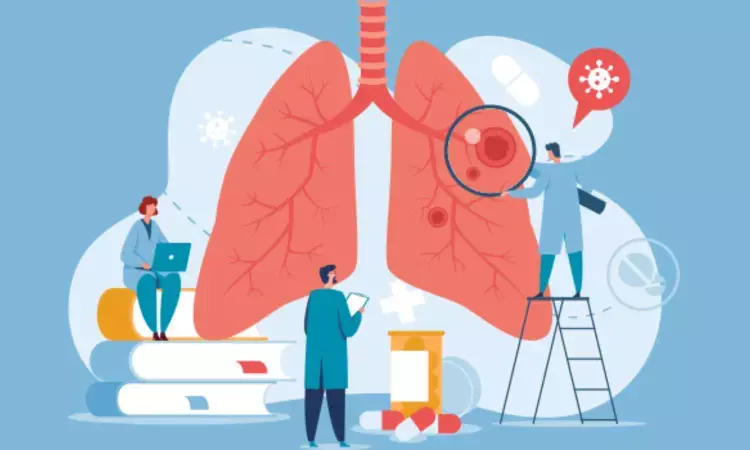- Home
- Medical news & Guidelines
- Anesthesiology
- Cardiology and CTVS
- Critical Care
- Dentistry
- Dermatology
- Diabetes and Endocrinology
- ENT
- Gastroenterology
- Medicine
- Nephrology
- Neurology
- Obstretics-Gynaecology
- Oncology
- Ophthalmology
- Orthopaedics
- Pediatrics-Neonatology
- Psychiatry
- Pulmonology
- Radiology
- Surgery
- Urology
- Laboratory Medicine
- Diet
- Nursing
- Paramedical
- Physiotherapy
- Health news
- Fact Check
- Bone Health Fact Check
- Brain Health Fact Check
- Cancer Related Fact Check
- Child Care Fact Check
- Dental and oral health fact check
- Diabetes and metabolic health fact check
- Diet and Nutrition Fact Check
- Eye and ENT Care Fact Check
- Fitness fact check
- Gut health fact check
- Heart health fact check
- Kidney health fact check
- Medical education fact check
- Men's health fact check
- Respiratory fact check
- Skin and hair care fact check
- Vaccine and Immunization fact check
- Women's health fact check
- AYUSH
- State News
- Andaman and Nicobar Islands
- Andhra Pradesh
- Arunachal Pradesh
- Assam
- Bihar
- Chandigarh
- Chattisgarh
- Dadra and Nagar Haveli
- Daman and Diu
- Delhi
- Goa
- Gujarat
- Haryana
- Himachal Pradesh
- Jammu & Kashmir
- Jharkhand
- Karnataka
- Kerala
- Ladakh
- Lakshadweep
- Madhya Pradesh
- Maharashtra
- Manipur
- Meghalaya
- Mizoram
- Nagaland
- Odisha
- Puducherry
- Punjab
- Rajasthan
- Sikkim
- Tamil Nadu
- Telangana
- Tripura
- Uttar Pradesh
- Uttrakhand
- West Bengal
- Medical Education
- Industry
Capsaicin cough reflex sensitivity may help prevent severe acute exacerbations among COPD patients

Patients suffering from Chronic Obstructive Pulmonary Disease (COPD) often face hospitalization due to severe acute exacerbation (AE) or community-acquired pneumonia (CAP). Now, a new study by BMJ open Respiratory Research suggests that the sensitivity of the cough reflex could be a crucial factor associated with these hospitalizations.
Researchers conducted a prospective study that included 68 COPD patients between June 2018 and January 2020. They assessed patient characteristics, lung and cardiac functions, and various biomarkers, including capsaicin cough reflex sensitivity and blood eosinophil count, upon enrollment. All participants were closely monitored for 12 months for any instances of AE or CAP requiring hospitalization.
The results revealed that eight patients experienced severe AE (3) or CAP (5) and needed hospitalization during the follow-up period. Patients in the hospitalization group demonstrated higher modified Medical Research Council scores and elevated blood eosinophil counts (≥300 µL) compared to those who didn't require hospitalization.
Most notably, the study showed that capsaicin cough reflex sensitivity seemed to decrease in patients who were later hospitalized due to AE or CAP. Through a multivariate analysis, the researchers identified decreased capsaicin cough reflex sensitivity and high eosinophil counts (≥300 µL) as predictive risk factors for future hospitalization due to AE-COPD or CAP.
This study has critical implications for the management of COPD. Beyond the already established relationship between elevated eosinophil counts and COPD exacerbations, the sensitivity of the cough reflex could potentially help identify those at higher risk of hospitalization.
This study highlights the significance of capsaicin cough reflex sensitivity in COPD patients. It not only identifies a previously overlooked risk factor for severe AE or CAP but also provides potential insights for preventive measures. By better understanding these associations, medical professionals may be better equipped to predict and manage hospitalizations in COPD patients, ultimately improving their overall quality of life.
Reference:
Kanemitsu, Y., Kurokawa, R., Akamatsu, T., Fukumitsu, K., Fukuda, S., Ito, Y., Takeda, N., Nishiyama, H., Ito, K., Tajiri, T., Mori, Y., Uemura, T., Ohkubo, H., & Niimi, A. (2023). Decreased capsaicin cough reflex sensitivity predicts hospitalisation due to COPD. In BMJ Open Respiratory Research (Vol. 10, Issue 1, p. e001283). BMJ. https://doi.org/10.1136/bmjresp-2022-001283
Neuroscience Masters graduate
Jacinthlyn Sylvia, a Neuroscience Master's graduate from Chennai has worked extensively in deciphering the neurobiology of cognition and motor control in aging. She also has spread-out exposure to Neurosurgery from her Bachelor’s. She is currently involved in active Neuro-Oncology research. She is an upcoming neuroscientist with a fiery passion for writing. Her news cover at Medical Dialogues feature recent discoveries and updates from the healthcare and biomedical research fields. She can be reached at editorial@medicaldialogues.in
Dr Kamal Kant Kohli-MBBS, DTCD- a chest specialist with more than 30 years of practice and a flair for writing clinical articles, Dr Kamal Kant Kohli joined Medical Dialogues as a Chief Editor of Medical News. Besides writing articles, as an editor, he proofreads and verifies all the medical content published on Medical Dialogues including those coming from journals, studies,medical conferences,guidelines etc. Email: drkohli@medicaldialogues.in. Contact no. 011-43720751


